
Hospodine pomiluj ny (English: Lord, Have Mercy on Us) is the oldest known Czech song. The hymn is a paraphrase of the Kyrie Eleison with deep choral melody. Its text preserves traces of Church Slavonic origin.

Hospodine pomiluj ny (English: Lord, Have Mercy on Us) is the oldest known Czech song. The hymn is a paraphrase of the Kyrie Eleison with deep choral melody. Its text preserves traces of Church Slavonic origin.
Author of the song, dating from the turn of 10/11th century, is unknown, but authorship is usually attributed to the Czech saint, missionary and martyr Svatý Vojtěch (St. Adalbert of Prague). The text has simple form with eight verses, without rhyme or stanzas. Its definitive version comes from time when Old Church Slavonic competed with Latin and absorbed Czech components.
First mention of the choral comes from 1055 when it was sung during election of duke Spytihněv II of Bohemia. The oldest recording appears in chronicle of Jan from Holešov from 1397. It was also sung during celebrations and as a war song. Charles IV used it during his coronation, Jan Hus during sermons given in Bethlehem Chapel in Prague. Together with Saint Wenceslas Chorale it is one of the first Czech national anthems. The song, almost unmodified, is still used during liturgy.
In modern Czech orthography: explanatory notes
Hospodine pomiluj ny Hospodine, pomiluj ny, Jezu Kriste, pomiluj ny, ty Spase všeho míra, spasiž ny, i uslyšiž, Hospodine, hlasy nášě; daj nám všém, Hospodine, žizň a mír v zemi; žizň a mír v zemi. Krleš, Krleš, Krleš!
O Domine, miserere O Domine, miserere, Iesu Christe, miserere, Salus es totius mundi, salva nos et percipe, o Domine, voces nostras; da cunctis, o Domine, panem, pacem terrae; panem, pacem terrae. Kyrie eleison!
(translated by M. B. Boleluczky)
Lord! have mercy upon us. Lord! have mercy upon us. Jesus Christ! have mercy upon us. Thou, Saviour of the whole world, Save us, and listen, Lord! to our voices. Give us all, O Lord, Plenteousness and peace on earth. Kyrie Eleison!
(translated by John Bowring)
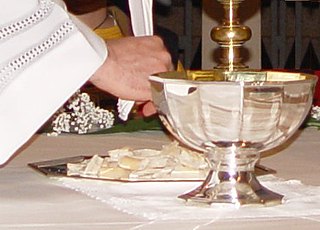
Agnus Dei is the Latin name under which the "Lamb of God" is honoured within Christian liturgies descending from the historic Latin liturgical tradition, including those of Roman Catholicism, Lutheranism and Anglicanism. It is the name given to a specific prayer that occurs in these liturgies, and is the name given to the music pieces that accompany the text of this prayer.

The Requiem in D minor, K. 626, is a Requiem Mass by Wolfgang Amadeus Mozart (1756–1791). Mozart composed part of the Requiem in Vienna in late 1791, but it was unfinished at his death on 5 December the same year. A completed version dated 1792 by Franz Xaver Süssmayr was delivered to Count Franz von Walsegg, who had commissioned the piece for a requiem service on 14 February 1792 to commemorate the first anniversary of the death of his wife Anna at the age of 20 on 14 February 1791.
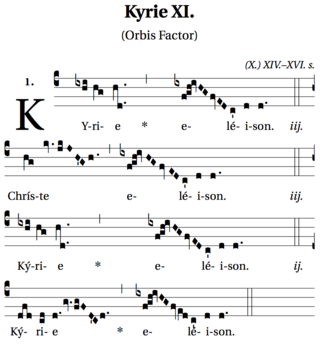
Kyrie, a transliteration of Greek Κύριε, vocative case of Κύριος (Kyrios), is a common name of an important prayer of Christian liturgy, also called the Kyrie eleison.
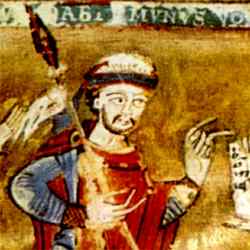
Spytihněv II, a member of the Přemyslid dynasty, was Duke of Bohemia from 1055 until his death in 1061.
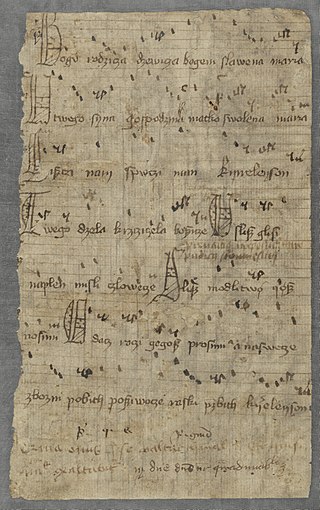
Bogurodzica, in English known as the Mother of God, is a medieval Christian hymn composed sometime between the 10th and 13th centuries in Poland. It is believed to be the oldest religious hymn or patriotic anthem in the Polish language, which was traditionally sung in Old Polish with the Greek phrase Kyrie eleison – "Lord, have mercy". While its origin is not entirely clear, several scholars agree that Saint Adalbert of Prague is the likely author. Polish knights chanted Bogurodzica prior to their engagement at the Battle of Grunwald and it also accompanied the coronation ceremonies of the first Jagiellonian kings.
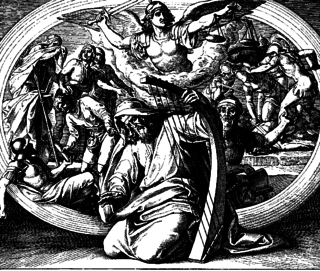
The Penitential Psalms or Psalms of Confession, so named in Cassiodorus's commentary of the 6th century AD, are the Psalms 6, 31, 37, 50, 101, 129, and 142.

The Trisagion, sometimes called by its opening line Agios O Theos, is a standard hymn of the Divine Liturgy in most of the Eastern Orthodox, Western Orthodox, Oriental Orthodox, and Eastern Catholic churches.

"Kyrie" is a song by American pop rock band Mr. Mister, from their album Welcome to the Real World. Released around Christmas in 1985, it hit the top spot on the Billboard Hot 100 in March 1986, where it was number 1 for two weeks. It also hit the top spot on the Billboard Top Rock Tracks chart for one week. In the UK, the song peaked at number 11 in March 1986.
Jacques Berthier was a French composer of liturgical music, best known for writing much of the music used at Taizé.

Gioachino Rossini's Petite messe solennelle was written in 1863, possibly at the request of Count Alexis Pillet-Will for his wife Louise, to whom it is dedicated. The composer, who had retired from composing operas more than 30 years before, described it as "the last of my péchés de vieillesse".

Vesting prayers are prayers which are spoken while a cleric puts on vestments as part of a liturgy, in both the Eastern and Western churches. They feature as part of the liturgy in question itself, and take place either before or after a liturgical procession or entrance to the sanctuary, as depends on the particular liturgical rite or use which is being observed.
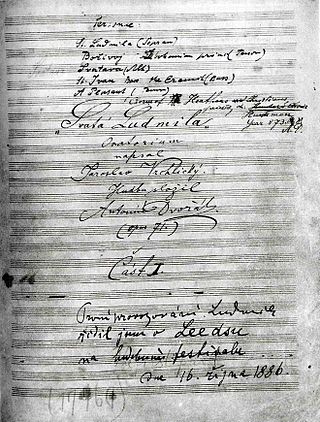
Antonín Dvořák composed his oratorio Saint Ludmila for soloists, choir and orchestra, between September 1885 and May 1886. The oratorio was written to a text by the leading Czech poet and writer Jaroslav Vrchlický. Saint Ludmila is Dvořák's third oratorio, and is considered one of his foremost works.
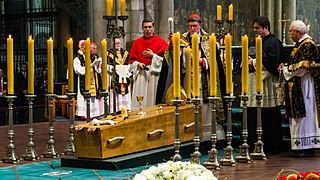
Absolution of the dead is a prayer for or a declaration of absolution of a dead person's sins that takes place at the person's religious funeral.
The embolism in Christian liturgy is a short prayer said or sung after the Lord's Prayer. It functions "like a marginal gloss" upon the final petition of the Lord's Prayer, amplifying and elaborating on "the many implications" of that prayer. According to the 1913 Catholic Encyclopedia, "[t]he embolism may date back to the first centuries, since, under various forms, it is found in all the Occidental and in a great many Oriental, particularly Syrian, Liturgies."
Lord Have Mercy or Lord, have mercy may refer to:
Jan z Holešova or Jan of Holešov was a Czech writer, linguist, musicologist, theologian, and one of the first ethnographers and a founder of modern comparative linguistics.

Da pacem Domine is the incipit of two different Latin chant texts: a votive antiphon and an introit. Both have been the base for musical compositions to be used inside or outside the liturgy. Paraphrased versions of the text were created by Martin Luther in German in 1529, "Verleih uns Frieden", also set by several composers. In English, the first of these texts entered the Book of Common Prayer as one of the preces at Morning and Evening Prayer (Evensong).

Verleih uns Frieden is a chorale cantata by Felix Mendelssohn, setting a prayer for peace by Martin Luther. Mendelssohn composed the short work in one movement for mixed choir and orchestra in 1831. It is also known as Verleih uns Frieden gnädiglich.